Introduction
Network marketing is one of the most misunderstood business models on the planet.
Some call it a scam. Others call it the reason they quit their 9-to-5. And somewhere in between are the millions of people who tried it… and quietly gave up.
So what’s the truth?
The real problem isn’t the model itself, it’s the confusion, the hype, the pressure to recruit, and the companies that blur the line between opportunity and manipulation.
This guide strips all that away.
You’ll learn exactly how network marketing works, where it thrives, where it fails, and how to know the difference. We’ll break down the legal structure, the controversy, the comparisons to affiliate marketing, and what success actually looks like (if it’s even the right path for you).
Whether you’re curious, skeptical, or already involved and not sure what’s real, this is the clarity you’ve been looking for.
Key Takeaways
What You Really Need to Know About Network Marketing
- Network marketing isn’t automatically a scam but most people treat it like a shortcut, not a business. That’s where things fall apart.
- The model is legal; execution is the problem. The difference between a pyramid scheme and a legitimate opportunity comes down to product value, not recruitment hype.
- You’ll see exactly how network marketing works, what’s real, and what’s red flag material so you can spot traps before they waste your time or money.
- We’ll break down the controversy, structure, and how it compares to affiliate marketing so you can make an informed choice, not an emotional one.
- This isn’t about belief, it’s about strategy. If you decide to go into network marketing, you’ll know how to do it with systems, tools, and a business owner mindset not slogans and spammy DMs.
Disclaimer: I am an independent Affiliate. The opinions expressed here are my own and are not official statements. If you follow a link and make a purchase, I may earn a commission.
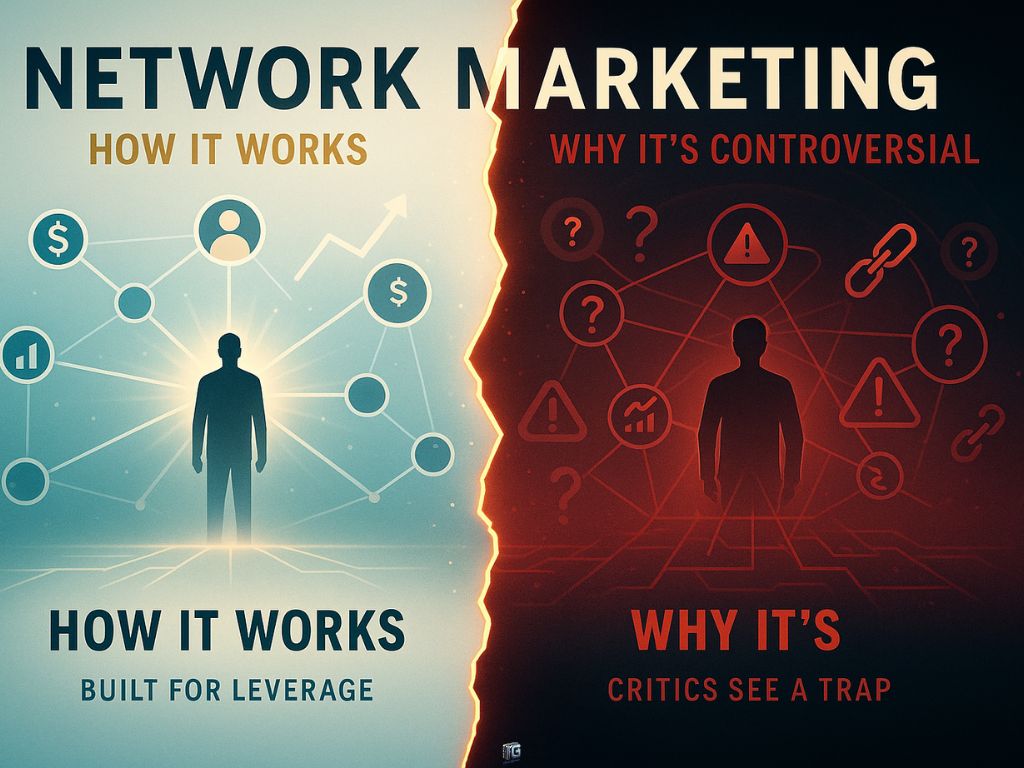
What Is Network Marketing?
At its core, network marketing is a business model where products are sold directly to consumers by independent distributors, people like you, not retail stores or ad agencies.
But there’s a twist: Distributors don’t just earn from what they sell. They also get paid when they help others start selling too.
That’s where the “network” comes in. You build a team (your downline), and you earn a cut of the revenue they generate. The person who brought you in (your upline) earns from your success, too.
This dual-income model product sales plus team-building overrides is what makes network marketing different from traditional sales.
Done right, it rewards leverage, leadership, and real value. Done wrong, it rewards hype, pressure, and recruitment games.
Here’s the real test:
If the products didn’t exist, would there still be a business?
If the answer’s yes, it’s not network marketing, it’s a pyramid scheme in disguise.
Legit companies use the model to scale customer reach through word-of-mouth and peer influence. Shady ones exploit it to sell dreams and overpriced starter kits.
Bottom line: Network marketing is just a structure. Whether it works or wrecks your reputation depends entirely on how it’s used.

How Does Network Marketing Actually Work?
At its core, network marketing is built on a simple idea:
You sell a product, and you can also earn by helping others sell it too.
This is what separates network marketing from traditional sales. You’re not just earning on your own effort, you’re building a system that pays you based on network leverage.
Let’s break it down step-by-step:
1. You join a company as a distributor
You typically sign up through an existing member, often called your upline. This gives you access to sell the company’s products or services and earn commissions.
Some companies charge a small enrollment fee or ask you to purchase a starter kit (more on that later not always a red flag, but something to watch).
2. You sell directly to customers
You earn retail or direct sales commissions by promoting the company’s products usually through social media, content marketing, in-person conversations, or private communities.
In a legitimate company, this step alone can generate income even if you never recruit a single person.
3. You recruit others to join as sellers
Here’s where the “network” comes in. You’re also incentivized to invite others to become distributors. These are your downline and you earn a percentage of their sales too.
Some companies let you earn overrides multiple levels deep, depending on the structure of their compensation plan. That’s where the “multi-level” part of Multi-Level Marketing (MLM) comes into play.
4. You earn on multiple levels
As your team grows, you start earning passive or leveraged income commissions based not just on what you sell, but what your team sells across several tiers. This is what draws people in: the potential for exponential earnings.
But this only works long-term if the people in your team are selling to real customers, not just buying products to stay “qualified.”

The Good, The Bad, and The Grey Area
Here’s a quick side-by-side of what makes the model workable vs. what makes it problematic:
| Legit Network Marketing | Shady Network Marketing |
|---|---|
| Product is high-quality, in-demand | Product is overpriced or unnecessary |
| You can earn without recruiting | Recruiting is the only way to earn |
| Customers exist outside the network | No one buys unless they’re in the biz |
| Commissions come from real sales | Commissions come from fees and buy-ins |
| Clear income disclosures | Vague promises and flashy lifestyles |
| No mandatory monthly spending | High “qualification” costs to stay active |
Grey Area tip: If a plan technically has a product, but most revenue still hinges on recruiting or monthly autoship, proceed with caution.
So… Does It Actually Work?
Yes but not for everyone.
Most people fail because they think it’s a shortcut to passive income, not a business that takes time, skill, and strategy. The structure can work but it only pays off when you treat it like a profession, not a lottery ticket.
The real question isn’t whether network marketing works. It’s whether the company’s model and your skillset make it work for you.
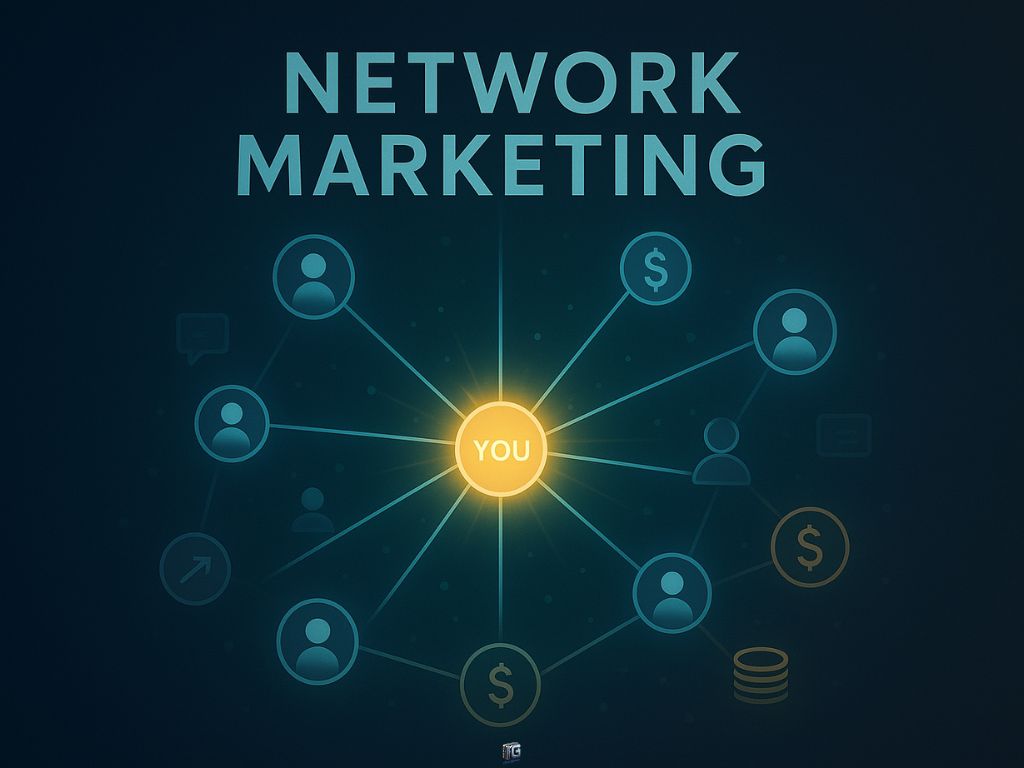
Why Network Marketing Is So Controversial
Few business models spark as much debate as network marketing. To some, it’s a smart way to build leveraged income without the overhead of traditional startups. To others, it’s a manipulative machine dressed up as “entrepreneurship.”
So why the split? Because network marketing walks a very thin line between empowerment and exploitation and not every company stays on the right side.
Let’s unpack the real reasons this model draws so much criticism:
1. It Looks (and Sometimes Acts) Like a Pyramid Scheme
Let’s be honest, the structure itself resembles a pyramid.
You earn from the people you recruit… who earn from the people they recruit… and so on.
But here’s the key distinction:
- Legal network marketing rewards product sales to real customers.
- Illegal pyramid schemes reward recruiting others regardless of product value.
When companies or reps emphasize building a team over selling a product, that’s when things get sketchy and regulators step in.
2. The Marketing Is Often Overhyped
- Scroll social media and you’ll see it:
- Screenshots of weekly payouts
- Promises of “freedom” in 90 days
- Photos of rented Lamborghinis and luxury trips
Meanwhile, the income disclosures (the real numbers) often tell a very different story where the majority earn little to nothing, and only the top 1% see meaningful income.
This disconnect creates false hope… and a lot of disillusioned ex-reps.
3. Reps Are Taught to Pressure Their Circles
Many people’s first experience with network marketing is… a weird DM from a former friend.
That’s because reps are often told to “start with your warm market” friends, family, coworkers and to pitch hard and fast.
It creates awkward conversations, strained relationships, and for many, a permanent distaste for the entire model.
4. There’s a Cult-Like Culture in Some Companies
Some companies (and uplines) blur the line between motivation and manipulation.
You’ll hear:
- “If you’re not succeeding, it’s your mindset.”
- “Don’t question the system, just follow the plan.”
- “Negative people just don’t get it, cut them out.”
These tactics keep people emotionally tied to the opportunity, even when it’s no longer serving them financially. It’s not business at that point it’s dogma.
5. It Targets Vulnerable People
Let’s be blunt: a lot of people join network marketing out of desperation not inspiration.
Single moms, laid-off workers, underpaid employees. People chasing freedom, not Ferraris.
And when they’re sold big dreams with no roadmap, they burn out fast often losing money they couldn’t afford to lose.
That’s why the model gets labeled predatory: not because everyone gets hurt… but because enough do to cause real concern.
So Is It All Bad?
No but it’s messy.
There are companies doing it right:
- Great products
- Transparent comp plans
- Ethical marketing
- Real customer focus
And then there are companies doing it very, very wrong.
The key is knowing how to spot the difference, so you don’t become a cautionary tale in someone else’s “why I left MLM” video.
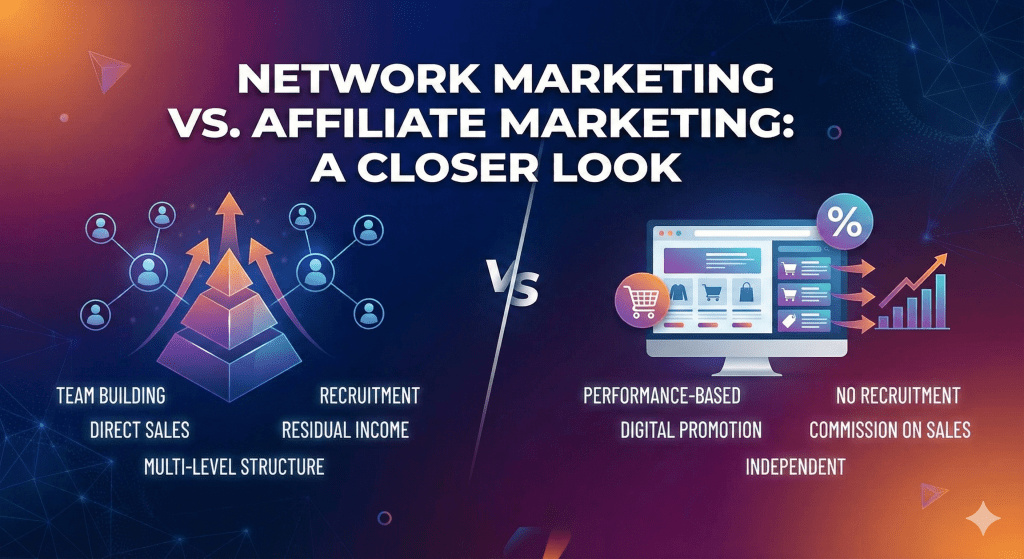
Network Marketing vs. Affiliate Marketing: A Closer Look
Network marketing and affiliate marketing are often lumped together as “online business models,” but under the surface, they function very differently.
Both offer a way to earn income by promoting products. Both appeal to those looking for flexibility and leverage. And both are praised and criticized for how they’re practiced.
But the similarities end there.
Where affiliate marketing focuses purely on product sales through content and referral links, network marketing adds layers: recruitment, downline overrides, and often, recurring personal volume requirements. One rewards marketing; the other rewards both selling and team-building.

Here’s how they compare side-by-side:
| Element | Network Marketing | Affiliate Marketing |
|---|---|---|
| Core Activity | Selling products and building a team | Promoting products through personal platforms |
| Team Building | Central; overrides on downline sales | Not part of the model; no override commissions |
| Payout Structure | Multi-level; commissions across generations | Single-level; earnings tied to personal referrals |
| Startup Costs | Often kits, subscriptions, or autoship | Usually free or minimal cost |
| Brand Control | Operate under company identity/guidelines | Full control over brand, message, monetization |
| Customer Ownership | Customers often tied to company/team | Own your leads, lists, and audience |
| Scalability | Depends on team duplication & outreach | Driven by content, automation, platform growth |
Network marketing often appeals to those who enjoy direct selling and leadership development, while affiliate marketing tends to attract creators, educators, and marketers focused on long-term content strategies.
Neither model is inherently better. Each has strengths, blind spots, and trade-offs. But the right fit depends on the business someone wants to build and the level of control they expect to have over it.
To learn more about their differences check out our Affiliate Marketing vs MLM Breakdown.
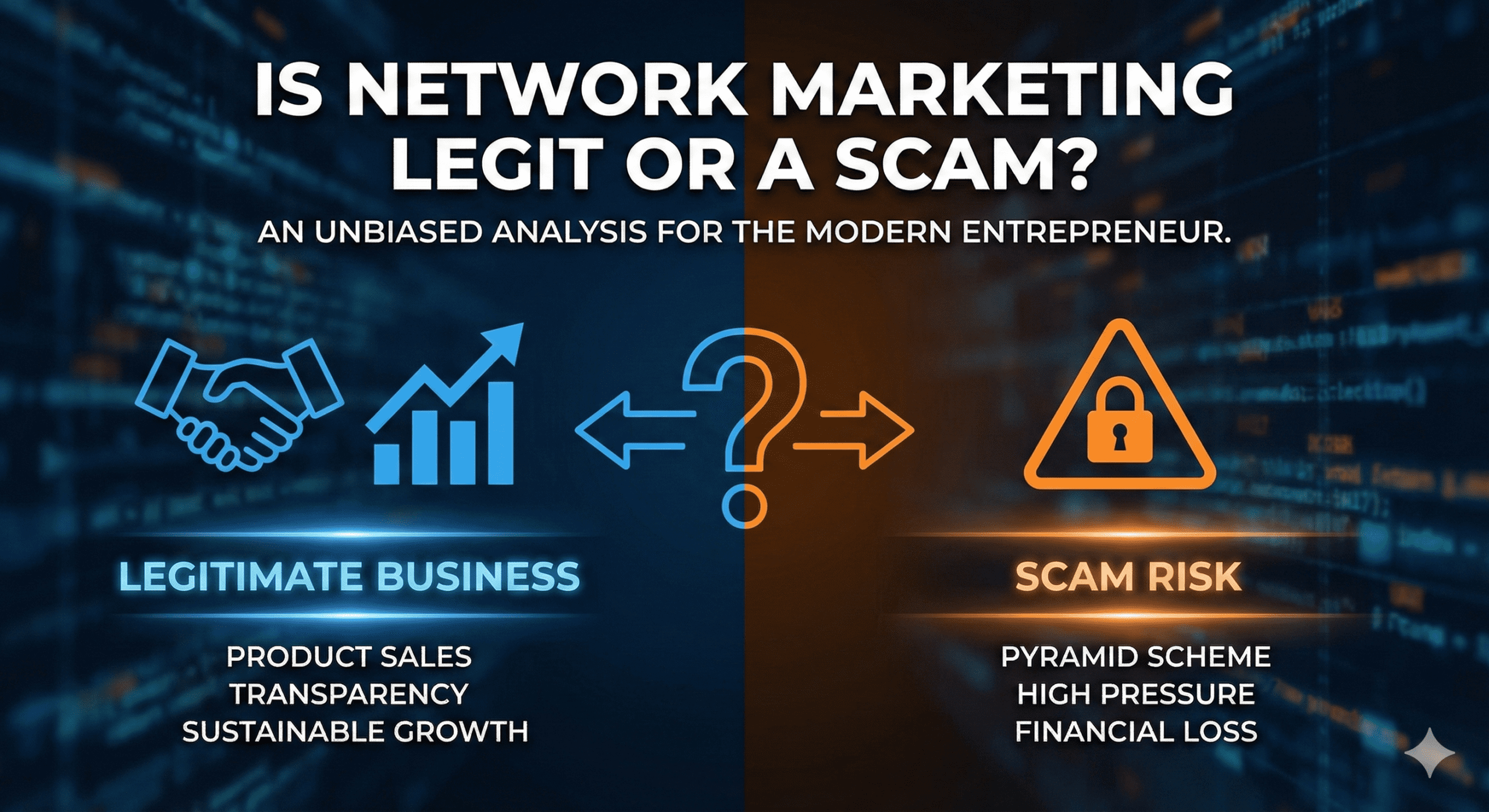
Is Network Marketing Legit or a Scam?
The debate over network marketing tends to produce more heat than light.
For every person who swears it changed their life, there’s someone else who walked away disillusioned financially drained, trust broken, and skeptical of the entire model.
But beneath the polarized opinions lies a more nuanced truth.
Network marketing is legal.
It’s a legitimate business structure based on direct product sales and word-of-mouth referrals. Many respected companies use it as a distribution strategy often instead of traditional advertising.
However, legality isn’t the same as credibility or sustainability.
Where things go sideways is in how the model is used. Some companies adhere strictly to ethical practices, focusing on real products, transparent compensation, and customer value. Others blur the line emphasizing recruitment over sales, inflating income claims, and encouraging buying over earning.
That’s where the “scam” label enters the conversation.
A few ways to tell the difference:
- In a legitimate model, income is earned primarily through real product sales to real customers whether or not they ever join the business side.
- In questionable models, earnings come mainly from recruiting others who are also required to buy in or stay active through monthly purchases.
The distinction is important. One is a business. The other is a disguised pyramid.
It’s also worth noting that many companies use culture to blur these lines, pushing lifestyle marketing, emotional persuasion, and fear-of-missing-out tactics to drive urgency. When image replaces infrastructure, participants often find themselves in a hype loop rather than a sustainable venture.
In short: The model itself isn’t broken. But when it’s misused, poorly regulated, or overhyped, the damage is very real and often deeply personal.

Real Ways to Succeed in Network Marketing (If You Choose It)
Most people don’t fail in network marketing because they’re lazy. They fail because they follow outdated tactics, copy hype-heavy leaders, and rely on pressure instead of systems.
Success in this model isn’t about charisma or chasing everyone you know. It’s about building credibility, leading with value, and using the right tools to stay consistent.
Here’s what that actually looks like in practice:
1. Lead with product clarity not opportunity hype
People are far more likely to buy something they understand than join something they don’t. When the focus is on solving real problems through the product, trust increases and so do conversions. The business conversation can follow later, once value has been demonstrated.
2. Build visibility through content, not cold DMs
Effective marketing in 2025 doesn’t look like sending scripts to strangers. It looks like creating helpful, relevant content that attracts interest and earns attention. Whether it’s short-form video, educational posts, or case studies visibility compounds when the approach is value-driven, not pushy.
3. Use systems to stay organized and consistent
Network marketing without systems becomes a guessing game. Tools like CRMs, automated follow-up sequences, and basic lead tracking workflows can make the difference between chaotic outreach and a scalable business. Automation doesn’t replace effort, it amplifies it.
4. Learn from practitioners, not performers
Results leave clues. Pay attention to leaders who quietly produce month after month, not just those who dominate team calls or social media. Proven systems, ethical strategies, and a customer-first mindset are better indicators of success than volume or visibility.
5. Approach it like a real business
Time, strategy, consistency, and reinvestment, those are the markers of any business that lasts. Network marketing is no different. Skipping steps or chasing shortcuts leads to burnout. Treat it like something worth building, and the results tend to follow.

Common Mistakes to Avoid in Network Marketing
Most people don’t fail in network marketing because they lack potential they fail because they walk straight into avoidable traps. Hype, misinformation, and poor strategy create a cycle that burns out new reps before they ever gain momentum.
Here are the most common mistakes that hold people back and how to avoid them:
1. Leading with the opportunity, not the product
Pitching a “business opportunity” before showing what the product actually does erodes trust fast. Most people aren’t looking for a side hustle, they’re looking to solve a problem. When the product is treated as an afterthought, so is the brand’s credibility.
→ Focus on value first. Let the product prove itself before the business model ever enters the conversation.
2. Relying on friends and family as your main strategy
Personal circles can offer support, but they’re rarely the foundation of long-term success. If outreach depends entirely on warm contacts, growth plateaus quickly and relationships often suffer.
→ Learn real marketing. Build your own pipeline through content, funnels, and systems, not just conversations.
3. Ignoring the numbers
Many reps celebrate likes, shares, or team growth without tracking sales, retention, or real income. Others don’t even know how the compensation plan works. That leads to surprises… and usually disappointment.
→ Track the right metrics. Understand where income comes from, what activities drive it, and what isn’t worth your time.
4. Choosing the wrong company for your strengths
Some companies require in-person sales. Others are built for content creators. Some offer high payouts with high learning curves. Joining based on hype, rather than fit, leads to frustration and burnout.
→ Audit your skills and choose a model that complements your style. Don’t just join align.
5. Treating it like a hustle, not a business
Casual effort creates casual results. Posting once a week, following up inconsistently, and waiting for luck to strike is not a strategy. Those who treat network marketing like a business with systems, tools, and planning are the ones who scale.
→ Be the professional. Build structure, use tools, track progress, and improve over time.
Avoiding these common mistakes won’t guarantee success but it will dramatically improve your chances of building something sustainable, ethical, and actually profitable.

Final Thoughts: Should You Get Into Network Marketing?
Network marketing isn’t black or white. It’s not a guaranteed win or a guaranteed scam.
It’s a business model, one that depends entirely on how it’s structured, who’s running it, and how it’s approached.
There are companies that focus on product value, customer satisfaction, and ethical compensation. And there are others that rely on hype, inflated claims, and endless recruitment games.
Likewise, there are marketers who treat it like a serious business building systems, developing content, and leading with integrity. And others who copy-paste scripts, chase strangers, and hope for fast money.
What determines the outcome isn’t just the company. It’s also the mindset, tools, and strategy behind the effort.
So if the model aligns with your skillset, if the product is something you believe in, and if the business is built on substance not just sales tactics it might be worth building.
But if it relies on pressure, secrecy, or promises that collapse under scrutiny… it’s time to walk away.
And if you’re still unsure? Start with something lower risk, higher control, and better-aligned with long-term ownership like affiliate marketing.
It requires no team building, no inventory, and no convincing friends to join anything.
Whatever path you take, don’t chase hype. Build something solid. The only real shortcut is doing it the right way from the start.
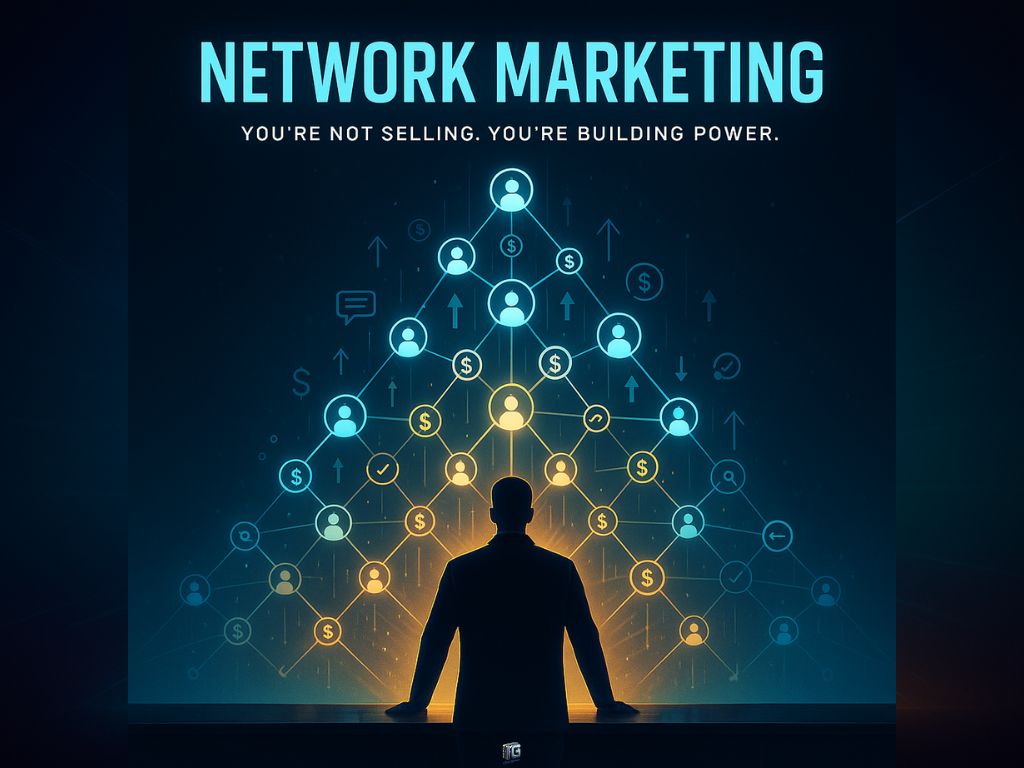
Frequently Asked Questions (FAQs)
Is network marketing legal?
Yes. The structure is legal when the focus is on selling real products to real customers. Problems arise when companies emphasize recruitment over product value, turning the model into something closer to a pyramid scheme which is illegal in most jurisdictions.
Is network marketing the same as multi-level marketing (MLM)?
Technically, yes. The terms are often used interchangeably. “MLM” tends to carry more negative weight, while “network marketing” is the preferred term in branding. Both describe the same compensation model: direct sales plus earnings from team-based referrals.
How do people make money in network marketing?
Income typically comes from two sources: commissions on personal product sales, and overrides (a percentage) from the sales made by a downline. The more volume generated personally and by the team the higher the potential earnings. However, the majority of reps earn little to nothing without a strong sales and follow-up system in place.
Can network marketing be done part-time?
It can, but part-time effort brings part-time results. Without systems in place (like automation tools, follow-up sequences, or content funnels), it often leads to burnout or inconsistent income. That said, some use it as a stepping stone to full-time entrepreneurship when approached strategically.
What’s the difference between network marketing and affiliate marketing?
Network marketing relies on both product sales and recruiting to build income. Affiliate marketing pays directly for product referrals, no team-building required. Affiliate models are typically lower-risk, with fewer obligations, and better suited for those who prefer digital business and content marketing.
Do I need to buy products every month to stay active?
Some companies require monthly purchases or autoships to remain eligible for commissions. Others don’t. This requirement doesn’t automatically mean the company is shady, but it’s a factor to examine closely especially if there’s more pressure to “stay qualified” than to actually sell.
What kind of tools make a difference in network marketing?
CRM systems, email automation tools, landing page builders, and simple content creation software can help professionals organize, communicate, and scale efficiently. The most successful reps treat their role like a business not a hustle and invest in tools that support consistency and growth.
Is it possible to succeed without recruiting anyone?
Yes but only in companies that allow commissions strictly through product sales. These are less common, and income potential is usually limited without team-building. Still, some reps prefer to focus purely on customer acquisition and can succeed if the product demand is strong enough.
4 Comments
Affiliate Marketing vs MLM: Don’t Choose Until You Read This - Ismel Guerrero. · May 18, 2025 at 8:29 am
[…] Next: Read our High-Ticket Affiliate Marketing Guide and check out our Network Marketing Guide. […]
Top Network Marketing Companies in 2025 (Ranked & Reviewed) - Ismel Guerrero. · May 18, 2025 at 11:19 am
[…] Next: Check out our Full Network Marketing Guide. […]
CRM for Network Marketing: Tools That Actually Help You Scale - Ismel Guerrero. · May 18, 2025 at 4:51 pm
[…] Next: Read our Network Marketing Guide Here. […]
Network Marketing Funnel: The Smartest Way to Grow in 2025 - Ismel Guerrero. · May 31, 2025 at 6:42 pm
[…] out our Network Marketing Guide and the Top Network Marketing Companies […]